- Homepage
- Beekeeping
- Beekeeping Journal
Beekeeping journal
Beekeeping journal for the years 2019 to 2025 in Hilton, South Africa. Yours of course will look quite different, but we all need to keep proper records.
It is the only way to enable you to look back and say, yes that was good, or no it wasn't.
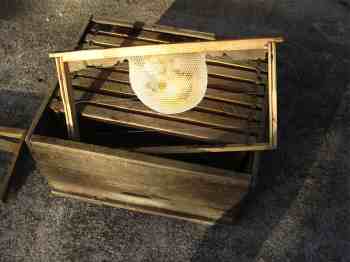
"Spectacular achievement is always preceded by unspectacular preparation."
- Robert H. Schuller
This page was created by Bernard Preston on 15th April, 2019.
It was last updated last in November, 2025.
January to March here in the Midlands of KZN, mid-summer, is our low season. There's not much in flower, certainly no surplus of the 'keeper, but our pets tick along. In 2022 it was very wet and cold, and we learned an important lesson; check your bees out, even just one hive month. I did not and they starved; we lost two colonies.
In 2023 the summer was similar but this time a little wiser, I knew I had to feed the bees; we lost no colonies.
It is one of the beauties of beekeeping; you don't usually have to feed your pets and they provide a bounteous harvest of sweetness for your larder. And for long periods you can totally neglect and ignore them if you have many other interests.
Unless it is a bad season and then one pays for lack of attention to detail; they die of starvation.
Or you could be delving into the brood-chamber every week if you choose.
If there is heavy rainfall in summer then usually there will be an abundant honey-flow starting in April and running into our mild winters. The bees don't like cold and wet obviously and have to be fed.
We know that a lot of the honey comes from Eucalyptus Grandis, but these days there are many clones being planted, and of course unknown wild flowers. It is an exceptionally lovely harvest but crystallises rock-hard, so we lightly cream it.
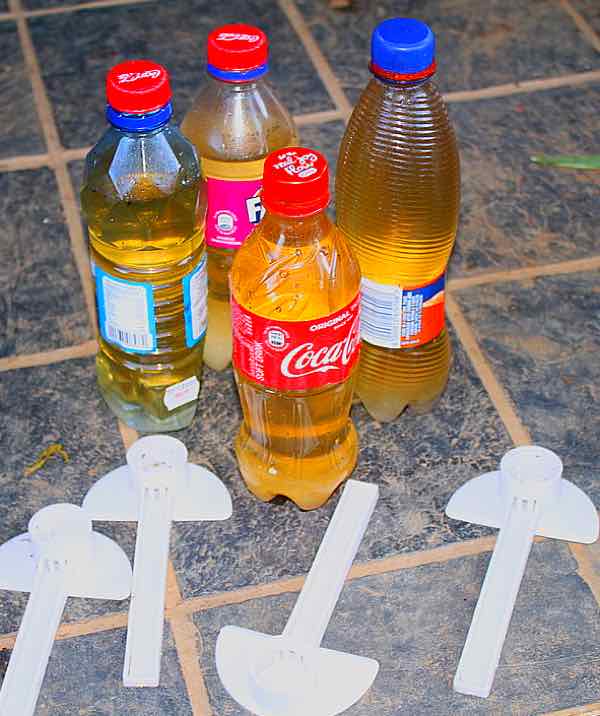
The bees are fed a limited amount of sugar solution in the dearth-period in late summer. They do not store the food provided it is less than 50% but it stimulates the queen to start laying in earnest early before the honey flow. Then the hives are strong at the start of the first flowering.
2024 and 2025
These years were also characterised by very wet summers that the bees didn't take kindly to; they needed to be fed and despite that, the usual gum crop in May was indifferent.
Then came the big surprise. We never get honey in July, the very coldest month in midwinter. In 2025 the bees seemed inordinately busy; from 12 hives I harvested an astonishing 250 pounds of prime honey. We have no idea what plant flowered but it clearly wasn't a late gum season.
2023
This has been another very wet summer. From our experience in 2022 we knew that we would have to feed the bees during the dearth. It paid dividends and we did not lose one colony this year.
2022
The summer of 2022 taught me an important lesson. Check out at least one hive every month; they desperately needed to be feed several times this year.
But I found a better way to feed the bees at an Open Day. Remove two frames from the super and put in a cut milk jug filled with sugar solution; cover the liquid with dry leaves and sticks so the workers don't drown.
2021
The year 2021 has shown great promise for an excellent harvest. It was a very wet summer which is usually a great start; or so I thought.
Autumn is the season of mellow fruitfulness; the Eucalypts are in flower and no doubt other unknown plants. A pollen analysis alas is not feasible. In April and May we harvested 100 and 150kg of prime honey from 11 hives; well pleased.
The gleanings from the cappings from the first harvest were used to make a terrific brown honey beer and the second will go into an all-hive mead.
There was promise of a third robbing in June but it never materialised.
Gleanings
Much waste honey known as the gleanings is produced in the production phase of producing a bottle of prime nectar; most of it comes from the cappings. We used to feed it back to the bees which is not really satisfactory for several reasons; now we turn into a braggart and mead; beer and wine using honey for the yeast to produce alcohol.
Done properly it is unbelievably good but it is an art in itself, taking a lot. Expect to pay good money if you ever want to buy any; it's not for the plebs.
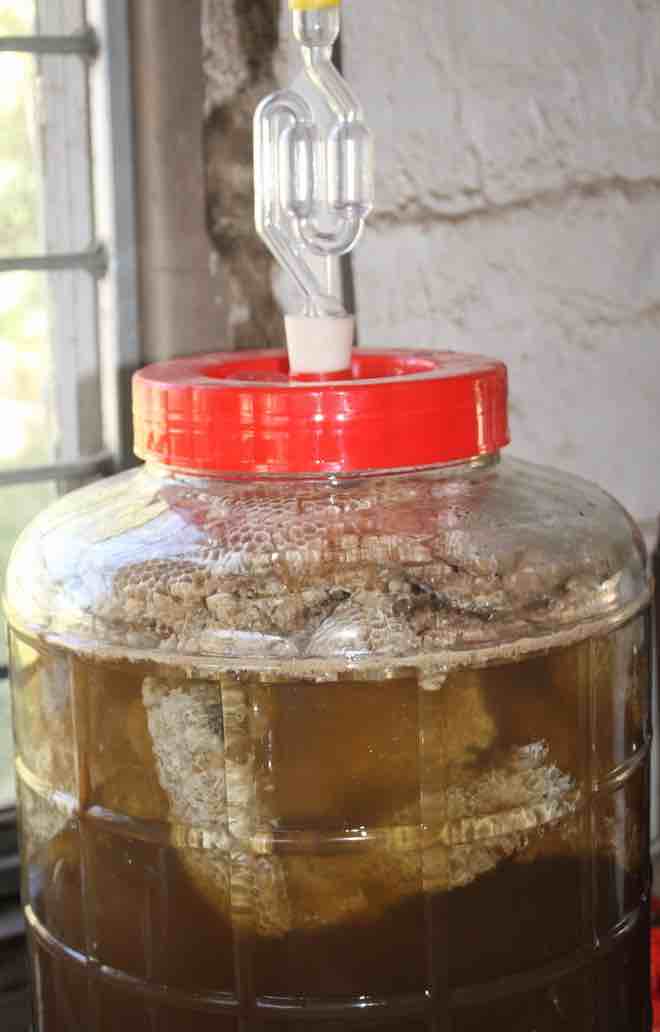
2022 was the start of making mead properly. This is a 23 litre carboy with honey gleaned from the cappings, burr comb and fruit weighed down with marbles; actually it should be called a melomel.
This spicy peppadew honey mead is the rage in South Africa right now; a mild chili flavour; won't be able to sample it for 6 months.
2020
On March 26 and 29 I fed the colonies 500 ml x 2 of sugar syrup to stimulate the queen to start laying.
On April 6 we held an Open Day at our green home; an unexpected 60 beginners arrived to find out how to start beekeeping.
We harvest 24 frames of only partially capped honey to demonstrate how to uncap the comb and use the extractor. The nectar was perhaps slightly green but passed one of the two tests to assess whether it was sufficiently mature to harvest. In future this unripe honey will go to making mead.
A manufacturer gave me ten supers for my trouble; he was delighted with the turnout. We help each other in life.
"That which is not good for the hive cannot be good for the bees."
- Marcus Aurelius, 121 to 180AD
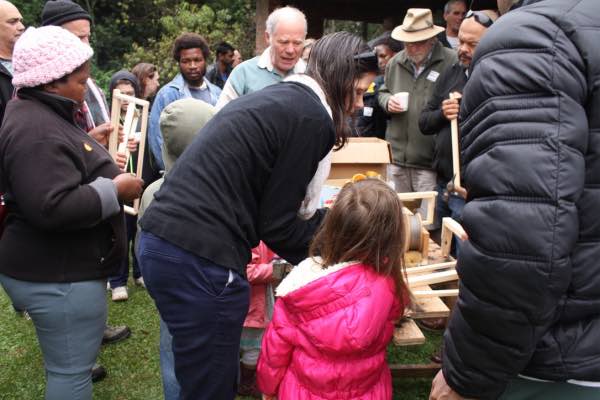
April 9 is a hot day, so I put the dry cappings into the solar wax extractor. I need foundation comb.
April 15: Bottled 25 jars of honey; 500 grams each. The honey was dark, with a very pleasant taste, but not eucalypt; probably blackjack weeds and general multiflora.
I bought an electronic scale this year; and discovered that I have been over-filling the jars.
April 16: Noticed that the bees in colony 9 are clustering at the entrance; they are preparing to swarm, and I must split them.
April 16: Rendered wax from the solar extractor to Evenrun Apiaries. R45 for 8 sheets of brood foundation.
Beekeeping journal
Beekeeping journal is very important for proper records so that you know whether you're succeeding in what you are doing; yours will look very different, of course, but the principles are the same.
If you don't keep a record of what you do, and analyse everything, you have no idea whether you are succeeding in your manipulation of the hives.
Today is April 19 but it is still too early in the flow for a proper harvest. There were only 9 fully capped frames in all 10 hives, and my extractor needs 24. Alas one swarm has absconded and needs to be replaced.
Soon there will be swarming bees.
May 11 and we are enjoying an Indian summer that continues late this year, with rain and heat unexpected this deep into autumn. The gum trees are not flowering properly yet; patience is a virtue, and meantime there is plenty of plenty of backyard permaculture to keep me out of mischief. This morning I must go out and forage for food for the worm farms from the greengrocer.
May 18 and the honey flow has definitely started, albeit slowly. Today I robbed 24 frames from 4 hives; that is the number the extractor will take.
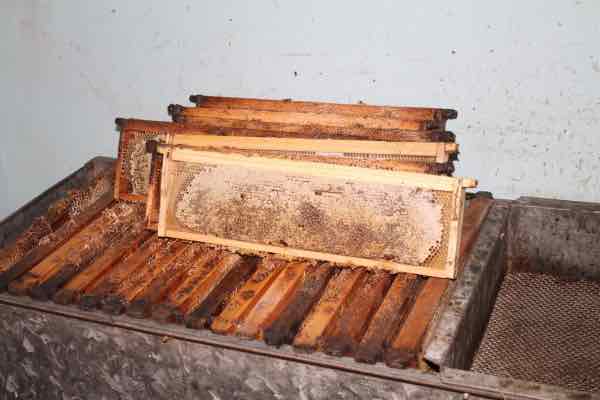
June 3 is close to the winter solstice; all beekeepers in the Midlands are complaining about a very indifferent winter honey flow this year. Some say their production is down by over 80%. Perhaps because of feeding in the late summer dearth, I have only a half to complain about.
Pollination
Far more important to the ecology of the planet, and of course our food, is pollination by bees.
One in three mouthful that we swallow are pollinated by bees.
With some plants, like nuts, you get virtually no crop without pollination by insects. Farmers have to hire about 10 hives per hectare from a beekeeper during the flowering stage in order to get a full harvest of macadamia or almonds, for example.
With such a high concentration of hives, there's very little honey to be harvested.
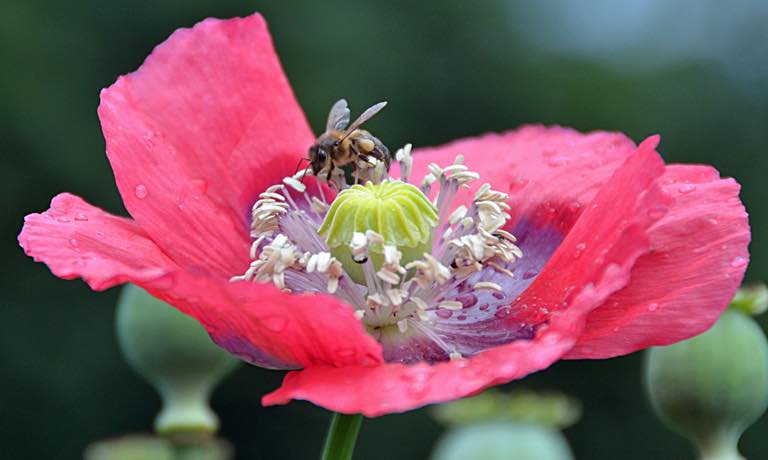
Opium farmers in Afghanistan also need bees, I suppose. Thank you Lorraine Harrison for these magnificent photos.
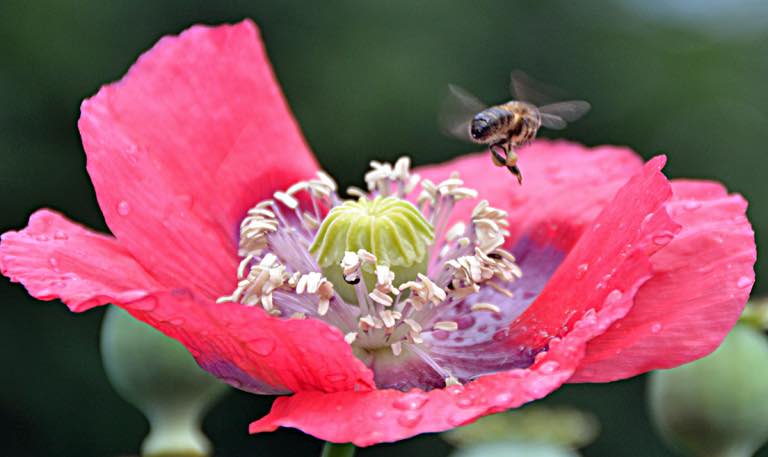
You can follow several different modus operandi harvesting honey.
Smelling good
Nectar directly from the flower is very dilute, so the bees have to concentrate it to reduce the water content down to about 16%. You'll see them at the entrance to the boxes fanning madly; a wonderful scent fills the apiary as many phytochemicals are driven off, giving the beekeeper an indication that it's time to check out the hives.
June 27 and the shortest day has passed; perhaps there will be a late winter flow this year. It's smelling good in the garden and the bees are getting fierce again. Do they have something to defend from the robber?
July 28th and yes they certainly do and a very nice harvest but I made the mistake of waiting too long again. It's midwinter and some of the honey has crystallised in the comb.
Set honey
Some speak of "set honey" but we use the term crystallisation. It is a supersaturated solution so in the cold weather ours turns very hard; these phrases are applied loosely.
The consumer is not fond of rock-solid crystallised honey, so I cream the lot; then it stays soft like peanut butter.
It is a simple process really using a paddle set in a powerful drill. I can do 10kg at a time, for about two minutes, so it is not onerous.
One does need to be mindful though. That spinning paddle could flay your hand if you allowed the bucket to drift.
Creamed honey does add value, commanding a higher price and we just prefer it ourselves. It does not drip off the toast and trickle down to the elbows like watermelon juice.
When browsing use right click and "Open Link in New Tab" or you may get a bad gateway signal.
The material expressed on this page is gleaned from the nutritional and environmental literature; it is clearly referenced. A plain distinction is made between the author's opinion and that which is scientifically proven. When in doubt consult your health professional.
To suggest a correction or clarification, write to Dr Bernard Preston here. Contact.
Newsletter
Our newsletter is entitled "create a cyan zone" at your home, preserving both yourself and Mother Earth for future generations; and the family too, of course. We promise not to spam you with daily emails promoting various products. You may get an occasional nudge to buy one of my books.
Here are the back issues.
- Lifestyle and ideal body weight
- What are ultra-processed foods?
- Investing in long-term health
- Diseases from plastic exposure
- Intensive lifestyle management for obesity has limited value
- A world largely devoid of Parkinson's Disease
- The impact of friendly bacteria in the tum on the prevention of cancer
- There's a hole in the bucket
- Everyone is talking about weight loss drugs
- Pull the sweet tooth
- If you suffer from heartburn plant a susu
- Refined maize meal and stunting
- Should agriculture and industry get priority for water and electricity?
- Nature is calling
- Mill your own flour
- Bake your own sourdough bread
- Microplastics from our water
- Alternative types of water storage
- Wear your clothes out
- Comfort foods
- Create a bee-friendly environment
- Go to bed slightly hungry
- Keep bees
- Blue zone folk are religious
- Reduce plastic waste
- Family is important
- What can go in compost?
- Grow broad beans for longevity
- Harvest and store sunshine
- Blue zone exercise
- Harvest and store your rainwater
- Create a cyan zone at your home
Did you find this page interesting? How about forwarding it to a friendly book or food junkie? Better still, a social media tick would help.
- Homepage
- Beekeeping
- Beekeeping Journal
Address:
56 Groenekloof Rd,
Hilton, KZN
South Africa
Website:
https://www.bernard-preston.com